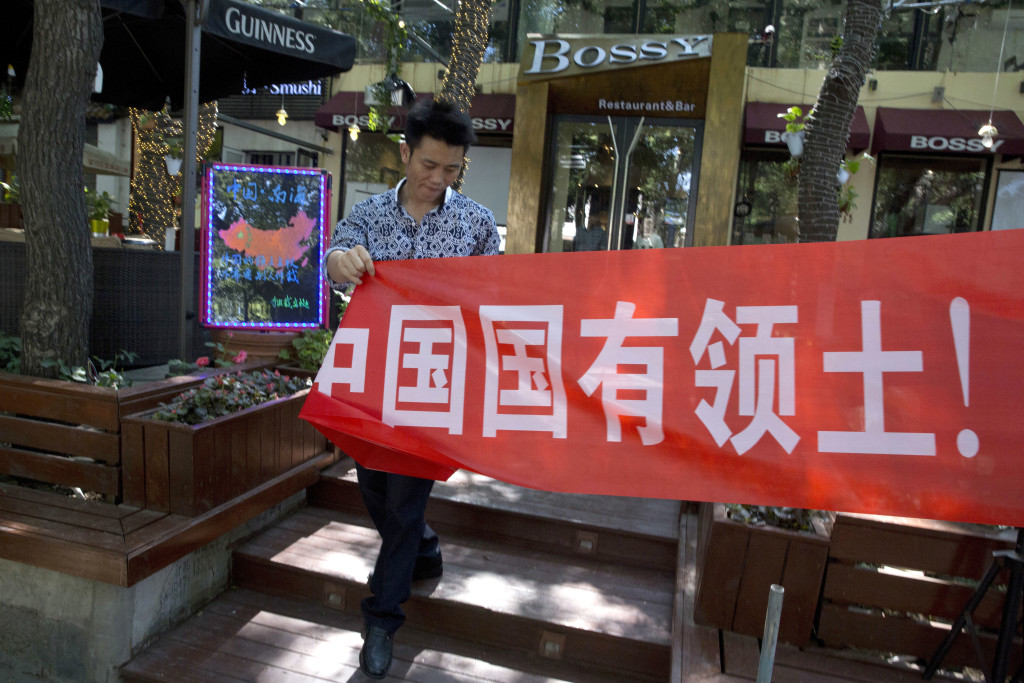
A worker of a restaurant bar puts up a banner which partly reads: “South China Sea is China’s territory” in Beijing Wednesday, July 13, 2016. China warned other countries Wednesday against threatening its security in the South China Sea after an international tribunal handed the Philippines a victory by saying Beijing had no legal basis for its expansive claims there. AP
The heightening South China Sea disputes should be resolved through an establishment of an Eminent Persons’ Group (EPG) within the Asean-China dialogue, a notion suggested at the conclusion of a high-level seminar in Vientiane on Tuesday.
The dialogue can take place under the Declaration of Conduct framework to look into all options that “functional cooperation” could be made operational in the various cases of disputed areas in the South China Sea, the Asian Peace and Reconciliation Council (APRC), the organizer of the seminar, concluded.
The event took place on Tuesday in Laos, the Asean Chair 2016, as an international tribunal in The Hague, ruled in favor of the Philippines over China on a sovereignty claim.
APRC is chaired by former Thai foreign minister Dr. Surakiart Sathirathai. Participants at the seminar included Jigmi Thinley, former Bhutan prime minister; Syed Hamid Albar, former Malaysia foreign minister; Raphael Lotilla, former Philippine energy minister; and former senior Thai officials Tej Bunnag and Weerasak Kowsurat.
It was also attended by about 20 academics from Australia, Portugal, India, China, Malaysia and Vietnam. The group included two Law of the Sea academics: Professor Dr Vivian Loius Forbes and Professor Dr. Vasco Becker-Weinberg.
Jigmi Thinley was quoted as saying that “The rising tension in the South China Sea renders the proposition for functional cooperation indispensable as a sensible, profitable and indeed, practicable means to deepen mutual appreciation and trust among neighbors. It will enable all concerned to shift focus from seemingly irreconcilable and confrontational disputes to finding common grounds for cooperation and thereby also ensure the continued security of the sea lanes of communication.
“In order for such am initiative to succeed, it is my belief that a willingness to understand and appreciate each other’s fears and concerns with the empathy of an open heart is a precondition. It is such a condition that opens and emboldens the mind to imagine possibilities and avenues for win-win solutions that may otherwise be dismissed as unthinkable and excessively idealistic,” he added.
Functional cooperation is seen as a model that can build the confidence and trust, improve the atmosphere and increase the comfort levels needed before claims on sovereignty can be discussed, and it can provide another track to preserve peace and stability and avert future armed confrontations.
It allows for all parties to look for common interests and cooperative uses of the disputed areas and their natural resources while negotiations on sovereignty and borders are ongoing, said APRC.
Functional cooperation is also within the provisions of UNCLOS and Article 6 of the Declaration of Conduct for Parties in the South China Sea and can run parallel with ongoing sovereignty negotiations, and the seminar welcomes efforts to conclude the Code of Conduct of Parties in the South China Sea.
A general consensus at the Vientiane seminar concurred that the South China Sea disputes must be resolved by the sovereign states concerned, in accordance with the principles of international law, including UNCLOS and DOC, and only through negotiations to reach an agreement. In order to maintain peace and stability, there must be restraint and mutual-trust, and that settling the South China Sea issues should be the concern only of countries in the region, and should not be subject to extra-regional power interference.
APRC said lessons can also be taken from the Australia-Indonesia Maritime Delimitation Treaty. In addition, past agreements between Vietnam and China, as well as among China, Philippines and Vietnam, can be seen with some optimism. Other pertinent functional cooperation agreements worldwide include Falkland Islands, the cooperation in the North Sea, and between Senegal and Guinea Bissau, and Tunisia and Libya.
Lessons from these examples could be applied in the South China Sea; the protection and preservation of the marine environment such as through the establishment of joint marine reserves or undertaking joint research were noted as being particularly important not only to maintaining peace and stability but also to protect the health and livelihood of the people of the region.
Sustainable management of fisheries, such as through fishing activities, implementing a fisheries management agreement or undertaking research can also be of use. In addition, joint investment ventures, resource exploration and use, joint management of freedom and safety of navigation, humanitarian and disaster relief, aeronautical safety, and joint tourism cooperation have also been mooted as potential pathways of functional cooperation moving forward.
One of the key factors in enabling functional cooperation includes political will. Participants were heartened by the growing consensus of the role that functional cooperation can play in the South China Sea among all claimants in the region. In particular, the early signs that Philippines President Rodrigo Duterte’s new administration would seek to pursue joint development in overlapping economic zones is encouraging, and there was hope that such positive overtures would be reciprocated among other claimants./rga
RELATED STORIES
Philippines wins arbitration case vs. China over South China Sea
South China Sea ruling hailed as equalizing small countries
RELATED VIDEOS

